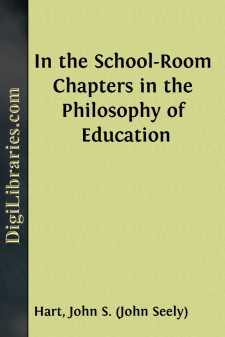Categories
- Antiques & Collectibles 13
- Architecture 36
- Art 48
- Bibles 22
- Biography & Autobiography 813
- Body, Mind & Spirit 142
- Business & Economics 28
- Children's Books 17
- Children's Fiction 14
- Computers 4
- Cooking 94
- Crafts & Hobbies 4
- Drama 346
- Education 46
- Family & Relationships 57
- Fiction 11829
- Games 19
- Gardening 17
- Health & Fitness 34
- History 1377
- House & Home 1
- Humor 147
- Juvenile Fiction 1873
- Juvenile Nonfiction 202
- Language Arts & Disciplines 88
- Law 16
- Literary Collections 686
- Literary Criticism 179
- Mathematics 13
- Medical 41
- Music 40
- Nature 179
- Non-Classifiable 1768
- Performing Arts 7
- Periodicals 1453
- Philosophy 64
- Photography 2
- Poetry 896
- Political Science 203
- Psychology 42
- Reference 154
- Religion 513
- Science 126
- Self-Help 84
- Social Science 81
- Sports & Recreation 34
- Study Aids 3
- Technology & Engineering 59
- Transportation 23
- Travel 463
- True Crime 29
In the School-Room Chapters in the Philosophy of Education
Description:
Excerpt
I.
WHAT IS TEACHING?
In the first place, teaching is not simply telling. A class may be told a thing twenty times over, and yet not know it. Talking to a class is not necessarily teaching. I have known many teachers who were brimful of information, and were good talkers, and who discoursed to their classes with ready utterance a large part of the time allotted to instruction; yet an examination of their classes showed little advancement in knowledge.
There are several time-honored metaphors on this subject, which need to be received with some grains of allowance, if we would get at an exact idea of what teaching is. Chiselling the rude marble into the finished statue; giving the impression of the seal upon the soft wax; pouring water into an empty vessel;—all these comparisons lack one essential element of likeness. The mind is, indeed, in one sense, empty, and needs to be filled. It is yielding, and needs to be impressed. It is rude, and needs polishing. But it is not, like the marble, the wax, or the vessel, a passive recipient of external influences. It is itself a living power. It is acted upon only by stirring up its own activities. The operative upon mind, unlike the operative upon matter, must have the active, voluntary co-operation of that upon which he works. The teacher is doing his work, only so far as he gets work from the scholar. The very essence and root of the work are in the scholar, not in the teacher. No one, in fact, in an important sense, is taught at all, except so far as he is self-taught. The teacher may be useful, as an auxiliary, in causing this action on the part of the scholar. But the one, indispensable, vital thing in all learning, is in the scholar himself. The old Romans, in their word education (educere, to draw out), seem to have come nearer to the true idea than any other people have done. The teacher is to draw out the resources of the pupil. Yet even this word comes short of the exact truth. The teacher must put in, as well as draw out. No process of mere pumping will draw out from a child's mind knowledge which is not there. All the power of the Socratic method, could it be applied by Socrates himself, would be unavailing to draw from a child's mind, by mere questioning, a knowledge, for instance, of chemical affinity, of the solar system, of the temperature of the Gulf Stream, of the doctrine of the resurrection.
What, then, is teaching?
Teaching is causing any one to know. Now no one can be made to know a thing but by the act of his own powers. His own senses, his own memory, his own powers of reason, perception, and judgment, must be exercised. The function of the teacher is to bring about this exercise of the pupil's faculties. The means to do this are infinite in variety. They should be varied according to the wants and the character of the individual to be taught. One needs to be told a thing; he learns most readily by the ear. Another needs to use his eyes; he must see a thing, either in the book, or in nature. But neither eye nor ear, nor any other sense or faculty, will avail to the acquisition of knowledge, unless the power of attention is cultivated. Attention, then, is the first act or power of the mind that must be roused. It is the very foundation of all progress in knowledge, and the means of awakening it constitute the first step in the educational art.
When by any means, positive knowledge, facts, are once in possession of the mind, something must next be done to prevent their slipping away. You may tell a class the history of a certain event; or you may give them a description of a certain place or person; or you may let them read it; and you may secure such a degree of attention, that, at the time of the reading or the description, they shall have a fair, intelligible comprehension of what has been described or read. The facts are for the time actually in the possession of the mind. Now, if the mind was, according to the old notion, merely a vessel to be filled, the process would be complete. But mind is not an empty vessel....


